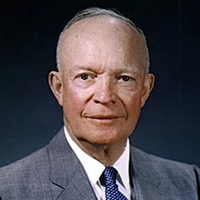Quotes By Dwight Eisenhower

Leader
Dwight Eisenhower
Oct 14, 1890 - Mar 28, 1969
We have now gained a truce in Korea. We do not greet it with wild rejoicing. We know how dear its cost has been in life and treasure.
When I found the first camp like that I think I never was so angry in my life. The bestiality displayed there was not merely piled up bodies of people that had starved to death, but to follow out the road and see where they tried to evacuate them so they could still work, you could see where they sprawled on the road. You could go to their burial pits and see horrors that really I wouldn't even want to begin to describe. I think people ought to know about such things. It explains something of my attitude toward the German war criminal. I believe he must be punished, and I will hold out for that forever.
But the most interesting - although horrible - sight that I encountered during the trip was a visit to a German internment camp near Gotha. The things I saw beggar description. While I was touring the camp I encountered three men who had been inmates and by one ruse or another had made their escape. I interviewed them through an interpreter. The visual evidence and the verbal testimony of starvation, cruelty and bestiality were so overpowering as to leave me a bit sick. In one room, where they [there] were piled up twenty or thirty naked men, killed by starvation, George Patton would not even enter. He said he would get sick if he did so.
One of my predecessors is said to have observed that in making his decisions he had to operate like a football quarterback - he could not very well call the next play until he saw how the last play turned out. Well, that may be a good way to run a football team, but in these days it is no way to run a government.
A sound nation is built of individuals sound in body and mind and spirit. Government dares not ignore the individual citizen.
Education is really bread and butter citizenship. It is just necessary to the developing of citizens that can perform their duties properly.
Whatever America hopes to bring to pass in the world must first come to pass in the heart of America.
I belong to a family of boys who were raised in meager circumstances in central Kansas, and every one of us earned our way as we went along, and it never occurred to us that we were poor, but we were.
The hope of the world is that wisdom can arrest conflict between brothers.
Youth - our greatest resource - is being seriously neglected in a vital respect. The nation as a whole is not preparing teachers or building schools fast enough to keep up with the increase in our population.
I say with all the earnestness that I can command, that if American mothers will teach our children that there is no end to the fight for better relationships among the people of the world, we shall have peace.
In this connection, I should mention our enormous national debt. We must begin to make some payments on it if we are to avoid passing on to our children an impossible burden of debt.
I am not here, of course, as one pretending to any expertness on questions of youth and children - except in the sense that, within their own families, all grandfathers are experts on these matters.
Our civil and social rights form a central part of the heritage we are striving to defend on all fronts and with all our strength. I believe with all my heart that our vigilant guarding of these rights is a sacred obligation binding upon every citizen.
When we got into the Little Rock thing, it was not my province to talk about segregation or desegregation. I had the job of supporting a federal court that had issued a proper order under the Constitution, and where compliance was prevented by action that was unlawful.
We continue to uncover German concentration camps for political prisoners in which conditions of indescribable horror prevail. I have visited one of these myself and I assure you that whatever has been printed on them to date has been understatement.
Obviously all of us know that the composition that was reached in Korea is not satisfactory to America, but it is far better than to continue the bloody, dreary, sacrifice of lives with no possible strictly military victory in sight.
Ours would be a sickly democracy - sluggish with age and complacence - if we did not debate great issues with honest zeal. Any enemy that professes to find comfort in this fact confesses his ignorance of democracy's true strength.
Together we must learn how to compose difference, not with arms, but with intellect and decent purpose.
Popular Authors










